Here's when robots will start beating humans at every task
Don't expect to see a human behind the wheel of an 18-wheeler by 2027. Or a set of human hands performing a delicate surgery by 2053.
According to a new study from Oxford and Yale University researchers, those are the years artificial intelligence is slated to take over each of those tasks. And so it will go for millions of other jobs over the next 50 years, researchers find.

Skye Gould/Business Insider
Lead investigator Katja Grace and her colleagues found the tasks most likely to get automated within the next 10 years were rote, mechanical tasks. Language translation could outpace human performance by 2024, responses indicated, and robots may be able to write better high-school-level essays than humans in 2026.
More complex and creative tasks, like writing books and performing high-level math, will take longer. Ultimately, the researchers found AI could automate all human tasks by the year 2051 and all human jobs by 2136.
"Advances in artificial intelligence ... will transform modern life by reshaping transportation, health, science, finance, and the military," the researchers wrote. "These results will inform discussion amongst researchers and policymakers about anticipating and managing trends in AI."
 Some Tesla factory workers realized they were laid off when security scanned their badges and sent them back on shuttles, sources say
Some Tesla factory workers realized they were laid off when security scanned their badges and sent them back on shuttles, sources say I tutor the children of some of Dubai's richest people. One of them paid me $3,000 to do his homework.
I tutor the children of some of Dubai's richest people. One of them paid me $3,000 to do his homework. India not benefiting from democratic dividend; young have a Kohli mentality, says Raghuram Rajan
India not benefiting from democratic dividend; young have a Kohli mentality, says Raghuram Rajan
 Indo-Gangetic Plains, home to half the Indian population, to soon become hotspot of extreme climate events: study
Indo-Gangetic Plains, home to half the Indian population, to soon become hotspot of extreme climate events: study
 7 Vegetables you shouldn’t peel before eating to get the most nutrients
7 Vegetables you shouldn’t peel before eating to get the most nutrients
 Gut check: 10 High-fiber foods to add to your diet to support digestive balance
Gut check: 10 High-fiber foods to add to your diet to support digestive balance
 10 Foods that can harm Your bone and joint health
10 Foods that can harm Your bone and joint health
 6 Lesser-known places to visit near Mussoorie
6 Lesser-known places to visit near Mussoorie



 Next Story
Next Story